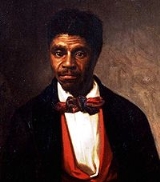
Dred Scott v. Sandford
Overview
United States Constitution
The Constitution of the United States is the supreme law of the United States of America. It is the framework for the organization of the United States government and for the relationship of the federal government with the states, citizens, and all people within the United States.The first three...
and could never be U.S. citizens.Despite the fact that the decision is no longer "jurisprudentially important," it nevertheless had, and continues to have, lasting cultural and historical ramification/implications .
The Opinion of the Court, written by Chief Justice
Chief Justice of the United States
The Chief Justice of the United States is the head of the United States federal court system and the chief judge of the Supreme Court of the United States. The Chief Justice is one of nine Supreme Court justices; the other eight are the Associate Justices of the Supreme Court of the United States...
Roger B. Taney
Roger B. Taney
Roger Brooke Taney was the fifth Chief Justice of the United States, holding that office from 1836 until his death in 1864. He was the first Roman Catholic to hold that office or sit on the Supreme Court of the United States. He was also the eleventh United States Attorney General. He is most...
, was, and remains, extremely controversial: legal scholars of diametrically opposed jurisprudence do not debate whether or not the decision was wrong, but rather why it is wrong.

